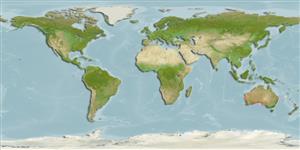Teleostei (teleosts) >
Carangiformes (Jacks) >
Carangidae (Jacks and pompanos) > Naucratinae
Etymology: Seriola: Latin word diminutive with the meaning of a large earthenware pot (Ref. 45335).
More on author: Günther.
Environment: milieu / climate zone / depth range / distribution range
Ecology
Marine; brackish; pelagic-neritic. Temperate; 18°C - 24°C (Ref. 27128); 25°S - 36°S
Indo-Pacific: endemic to Australia (Ref. 7300), Norfolk Island and New Zealand (Ref. 8879).
Size / Weight / Age
Maturity: Lm ? range ? - ? cm
Max length : 150 cm TL male/unsexed; (Ref. 9563); max. published weight: 53.1 kg (Ref. 6390)
Adults occur in inshore oceanic waters often associated with reefs, jetties and pylons (Ref. 6390), sometimes entering estuaries (Ref. 9563). They Prefer warmer water (18-24°C) although they are occasionally found in cooler water (Ref. 27128).
Life cycle and mating behavior
Maturity | Reproduction | Spawning | Eggs | Fecundity | Larvae
Paxton, J.R., D.F. Hoese, G.R. Allen and J.E. Hanley, 1989. Pisces. Petromyzontidae to Carangidae. Zoological Catalogue of Australia, Vol. 7. Australian Government Publishing Service, Canberra, 665 p. (Ref. 7300)
IUCN Red List Status (Ref. 130435: Version 2024-1)
Threat to humans
Harmless
Human uses
Fisheries: minor commercial; gamefish: yes
Tools
Special reports
Download XML
Internet sources
Estimates based on models
Preferred temperature (Ref.
123201): 16.7 - 23.6, mean 18.4 °C (based on 88 cells).
Phylogenetic diversity index (Ref.
82804): PD
50 = 0.5020 [Uniqueness, from 0.5 = low to 2.0 = high].
Bayesian length-weight: a=0.01122 (0.00514 - 0.02450), b=3.04 (2.87 - 3.21), in cm total length, based on all LWR estimates for this body shape (Ref.
93245).
Trophic level (Ref.
69278): 4.6 ±0.53 se; based on food items.
Resilience (Ref.
120179): Low, minimum population doubling time 4.5 - 14 years (Preliminary K or Fecundity.).
Fishing Vulnerability (Ref.
59153): Very high vulnerability (90 of 100).
Nutrients (Ref.
124155): Calcium = 19.6 [10.5, 44.8] mg/100g; Iron = 0.461 [0.256, 0.852] mg/100g; Protein = 18.9 [16.0, 21.7] %; Omega3 = 0.739 [0.438, 1.261] g/100g; Selenium = 15.4 [7.9, 28.8] μg/100g; VitaminA = 28.8 [3.4, 211.6] μg/100g; Zinc = 0.396 [0.277, 0.561] mg/100g (wet weight);
